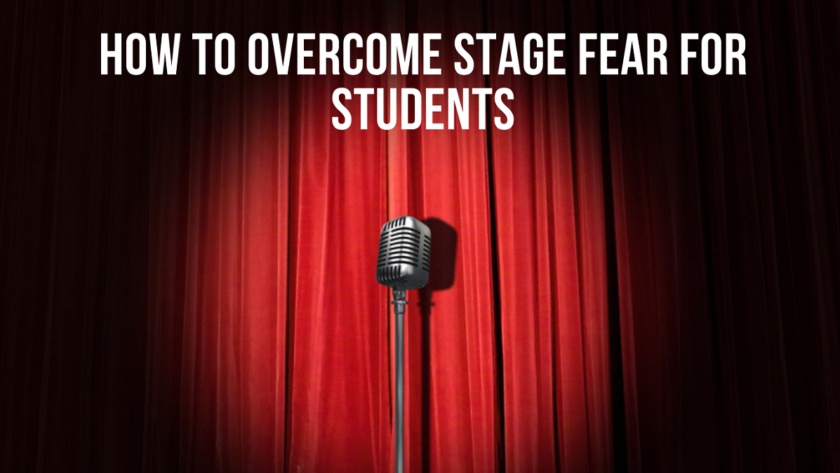Only an orator can recognise the potential of a public speaking platform. Do the world’s best orators have an innate and inborn talent to open themselves up in public? Definitely not. Stage fright, stage fear, or performance anxiety is very common, and believe us, 90 percent of people find themselves blank while giving their first performance on the stage. Studying online from home can be a great way for students to overcome stage fear by providing a safe and supportive environment to practice their public speaking skills. If you or your little one is facing such stage fear, then this blog is for you. What is stage fright, what psychology has a say on it, and a few tips on how to overcome stage fright? Yes, this blog covers substantial dimensions linked to stage fright. Keep reading!
What is stage fright?
It has been a nightmare even for students performing exceptionally well in their academics. The fear of speaking or performing in public is called stage fear. Imagine yourself performing in front of thousands of people staring at you. Is this relatable? If yes, then you need to work on it. Some of the most prominent leaders, including Warren Buffett, Mahatma Gandhi, and Thomas Jefferson, once suffered stage fright. Mahatma Gandhi once described his experience when he offered his first speech to a vegetarian community in London.
“My vision became blurred, and I trembled, though the speech hardly covered a sheet of foolscap.”– Mahatma Gandhi
So, yes, if you think of stage fright as a serious issue, then you are mistaken, mate. It is as normal as anything else. In the famous fight-or-flight response theory, Charles Darwin (an English naturalist) tried to explain that humans tend to respond naturally to any situation. The fear of being judged by the audience and losing their reputation creates a situation of pressure on a person. Such conditions are perceived as a situation of danger by the human mind and activate fight-or-flight response mechanisms in them.
Such a response is based on their past experiences or can be instinctive. This reaction gives rise to certain specific physical and mental conditions that are seen as common symptoms of stage fear like sweaty palms, tightening throat, voice shake, lightheadedness (a condition where you presume that you might faint), and stomach pain, etc. Nevertheless, the only thing that needs to be cleared here is that stage fright is not any kind of mental disorder and can be treated by a simple method. Want to learn how you can overcome stage fear? Continue reading further.
Best strategies that will help you overcome your stage fear.
1. Be war-ready; equip yourself with the best weapons available
What are you going to speak on the stage? Have you worked on it? If not, then you lack the basics. To be an outstanding orator, it is necessary to spend quality time reading and learning various dimensions of the given topic. Such time invested in the research is favourably vital as it assists you in accumulating sufficient fodder crucial to convey accurate information to the listeners.
Research also helps you highlight potential topics to grab the audience’s interest. For all the parents out there, you can administer your child by performing adequate research. It is like making your child war-ready and providing them with an incredible weapon to fight with. The same case applies to students who are preparing for an assignment viva or a presentation. Your comfort with the topic practically depends on the quality of research you do.
2. Talk to yourself, explain to yourself what you are going to talk about on the stage
“Knowledge is of no worth unless you put it into practice,” Anton Chekhov. Basically, appropriate topic selection is of no use until you are perfect in it. The only way that will help you become a successful speaker is to revise the entire draft which you have prepared after conducting comprehensive research on the topic. Please make a short note of your entire speech or a presentation and read it as many times as you want in front of the mirror.
Try to convince yourself with the points you will present to the audience. Arrange all the notes in a proper sequence, focus on one section at a time, and try to grasp the entire idea of the topic. Until and unless you are not sure about what you are trying to tell your audience, you will never get the confidence to stand and deliver it in one shot. So, talk to yourself, and explore the topic.
3. Reach a bit early at the venue

One of the biggest mistakes that students commit often is coming late to the set. The only recommendation I can give you here is to reach at least five minutes early at the venue where you are about to deliver the speech. Make yourself comfortable with the surroundings, feel relaxed, and set your spirit accordingly. Certainly, stage fear is not a mental issue, but it is a mental game that you need to play in your mind. It’s all about how fast you adapt yourself according to the changing conditions and react to the situation.
At the same time, reaching early also provides you with an opportunity to listen to other speakers. Likewise, you can note the audience’s behaviour and reaction to any punchline. For students, there are many instances where you will encounter your fellow mates as your primary audience. It can be challenging as well as accessible at the same time. It just depends on how you perceive the entire situation.
Your starting punch line selections must strictly be based on your listeners’ interest (if possible). In the case of fellow mates, it is pretty easy as you predict the topic. Whereas in the case of an unknown audience, this trick will help you hold your nerves in pressure situations.
4. That Crucial 5 minutes
Boost yourself in the first five minutes. Often, many students fail to perform exceedingly well in such situations. You can cite many reasons for that but losing control in the initial phase of the speech is the most prominent one among them. Let the moment pass. Do not start as soon as you reach the stage. Take your time, start with a formal introduction, and try to get familiar with the audience. Initial five minutes can be used to prepare yourself mentally and offers you an opportunity to confine your ideas and line them up strictly as per your strategy.
Feel confident about what you are delivering to your audience. Furthermore, these initial five minutes will help you stabilise your fight-or-flight reaction. Remember? Charles Darwin’s work that we discussed above. So, the next time you are on stage, do not forget Sir Darwin’s study, which will help you a lot.
5. Visualise Success:

What is the best way to succeed in an assignment? Undoubtedly, visualise yourself in that situation? How does the entire process of visualisation work? According to psychology, the human mind understands visual presentation better than verbal form. Likewise, the brain believes what you have visualised earlier and works accordingly.
Visualising yourself flourishing in the task helps create a confident position regarding the outcome. Hence, you perform better and with more intensity to achieve what you have already fantasised about. The moment you have a positive mindset toward what you are trying to achieve, you will start getting connected to the task even more fruitful than before. Similarly, the next time you find yourself surrounded by the audience, try to visualise yourself giving a compelling presentation.
Concluding remarks:
There is a considerable difference between anxiety and a mental disorder. The primary objective of this blog is to make readers aware of stage fear and the methods to ease yourself in such pressure situations. How can parents help their child to become a good speaker? Make your child practice the above-discussed tips religiously. Also, try to develop the practice of reading and learning the topics from various dimensions, and it will help you widen your mindset. Social-emotional learning can help students overcome stage fear by developing their self-confidence, resilience, and coping mechanisms. If you or your child is preparing for a presentation or a speech, just try to remember what Albert Einstein once said, “If you can’t explain it simply, you don’t understand it well enough.” So, work on a solid strategy that covers all the points; rehearse thoroughly, visualise your success, and deliver it in a single take.
Author’s Bio:
Robert Macro is an experienced and well-known writer who prioritises learners and their related problems and endeavours to settle them. Moreover, he is also working on creating student forums and services associated with platforms like assignments help lite striving to support students in resolving their assignments and academic writing concerns.

